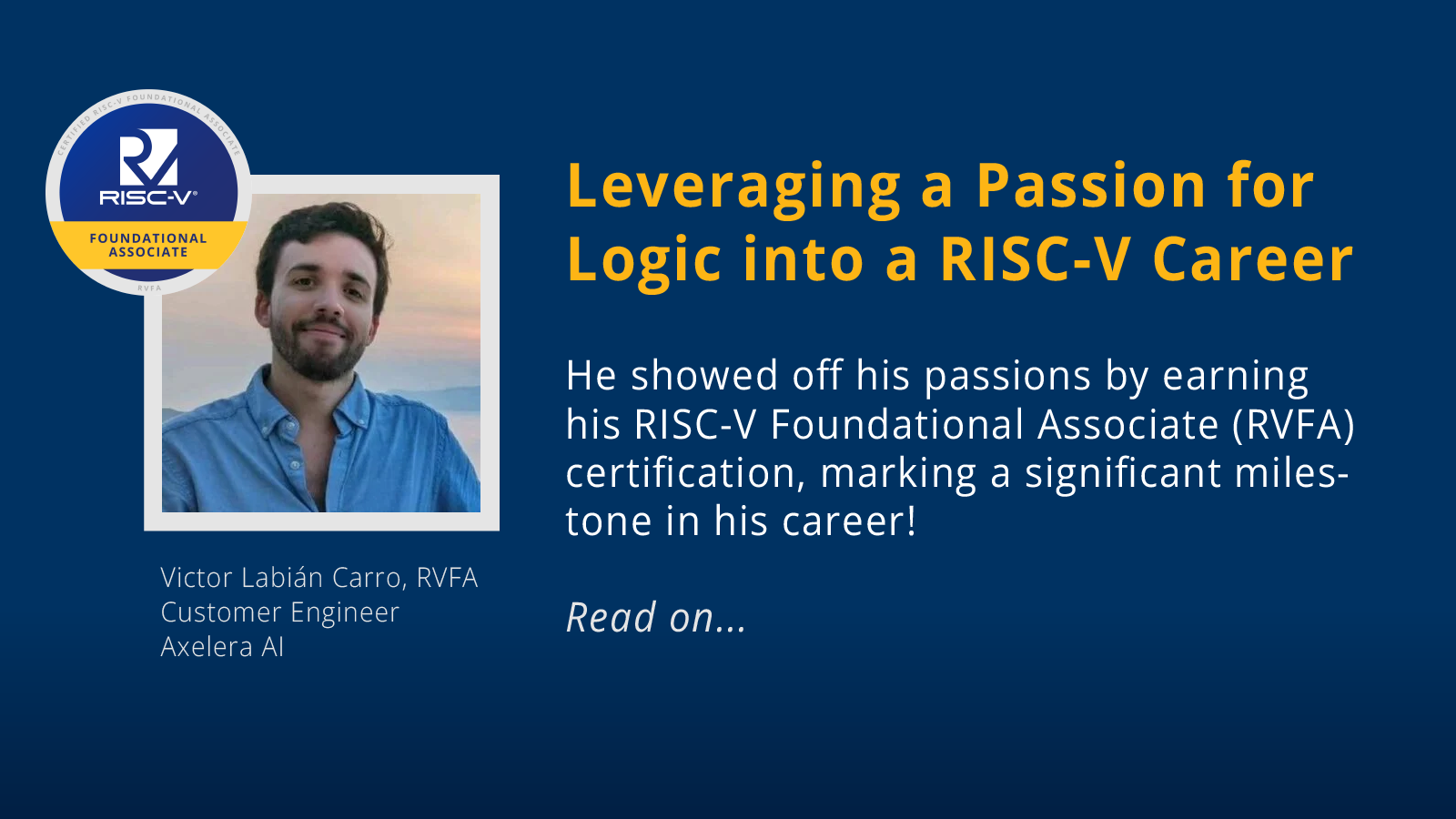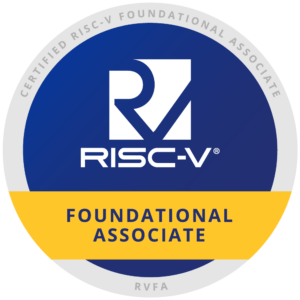

The path to success for an IT career is often paved with curiosity, dedication and a willingness to evolve. Victor Labián Carro, RVFA, now a Customer Engineer at Axelera AI, has taken his personal curiosity for logic, math and engineering and built it into a tech career he loves. Recently he showed off his passions by earning his RISC-V Foundational Associate (RVFA) certification, marking a significant milestone in his career.
It Started with a Passion for Problem-Solving
Beginning in High School it was clear to Victor that he enjoyed the challenge of solving problems using the logical structure of math and fundamental principles of physics. This passion led him to earn bachelor’s and master’s degrees in Industrial Engineering from Universidad Politécnica de Madrid, enabling him to merge his love for these disciplines with practical applications in technology.
During his university years, Victor excelled in subjects like industrial electronics, automation, and robotics—fields that allowed him to apply his analytical skills in innovative ways. His academic success, coupled with a burgeoning interest in computer architecture, laid the groundwork for his future career.
Professional Progress
Victor began his professional career as an Applications Engineer on the Compilers Support Team at Arm in Cambridge, UK. In this role, he worked on enabling customers to optimize their applications for different architectures by using the LLVM-based Arm Compiler and other development tools, honing his skills in low-level programming and hardware-software integration.
Victor’s next career move to Codasip as a Field Application Engineer introduced him to the concept of open standard hardware through his work with RISC-V. During his tenure at Codasip, he was responsible for designing and testing custom hardware and software solutions for clients in the automotive and industrial sectors helping him grow his expertise in processor design, profiling tools and system optimization.
Just recently, Victor started a new role as a Customer Engineer at Axelera AI, which uses RISC-V processors as part of their hardware and software platform which is designed to accelerate AI performance. There he is part of a team of engineers developing cutting-edge solutions that drive efficiency and performance across various industries. His work involves collaborating with software developers, systems engineers and product managers to ensure that the hardware they create aligns with clients’ needs and expectations. “I didn’t specifically pursue my RVFA for this job, but it is already clear that all my studying and experience needed to earn my RVFA is having an immediate, on-the-job impact,” said Victor.
RISC-V is the Future
Victor knows that the tech industry is constantly changing and that keeping his career goals on track requires continuous learning. When he was introduced to the open standard instruction set architecture of RISC-V he was intrigued by its flexibility and potential to drive innovation.
“RISC-V represents a significant shift in how we approach hardware design,” Victor explains. “It’s not just about using what’s available; it’s about creating something new and tailored to specific needs.”
 To take a deeper dive into RISC-V, Victor enrolled in RISC-V Fundamentals, from RISC-V International and Linux Foundation Education. The course provides a comprehensive overview of the RISC-V architecture, covering everything from its basic principles to its application in complex systems. “The course was both challenging and enlightening and, most importantly, it really helped me with my preparation and study for the RVFA certification exam,” said Victor.
To take a deeper dive into RISC-V, Victor enrolled in RISC-V Fundamentals, from RISC-V International and Linux Foundation Education. The course provides a comprehensive overview of the RISC-V architecture, covering everything from its basic principles to its application in complex systems. “The course was both challenging and enlightening and, most importantly, it really helped me with my preparation and study for the RVFA certification exam,” said Victor.
Applying Knowledge in the Real World
The RISC-V course and certification had a big impact on his work at Codasip, leveraging his RISC-V expertise to explore new options for hardware optimization and innovation. “The certification has given me a new lens through which to view projects,” said Victor. “I’m now able to contribute to discussions about hardware design in more meaningful ways.”
Some of the projects Victor is particularly proud of involve the development of custom RISC-V based solutions for clients that need to optimize performance for specific applications while keeping a reduced memory footprint. These activities not only allowed him to apply his newly acquired skills, but also reinforced the value of the RISC-V certification in practical, real-world scenarios.
Beyond the technical skills, Victor believes that the certification has enhanced his ability to serve his customers. “Understanding RISC-V allows me to offer more tailored solutions that align with our clients’ needs,” he said. “It’s not just about staying relevant; it’s about being able to provide value in an industry that’s constantly evolving.”
RISC-V and the Future
“The RVFA certification has opened up new avenues for my career and I’m eager to continue learning and growing in this space,” Victor said. And for those considering a similar path, Victor has these words of advice, “Technology changes fast. It’s important to keep up with new developments and to prove your new skills with certifications like the RVFA that give your career a competitive edge.”
Victor’s journey from a young math, physics and logic enthusiast to a well-established career path at the forefront of innovation is a testament to the power of continuous learning and the pursuit of excellence. As he thinks long-term about his career, he wants to keep learning about software and hardware architecture, particularly as it applies to artificial intelligence. From a job role perspective, he wants to continue in a customer engineering role as working with customers to develop solutions satisfies his passion for problem solving.
 Victor Labián Carro, RVFA
Victor Labián Carro, RVFA
Customer Engineer
Axelera AI
Your turn!
Take the leap and open up new avenues and opportunities for yourself. Get RISC-V certified! Register now for the RVFA and RISC-V Fundamentals Course bundle!
Related Posts
Announcing the 2025 AI & RISC-V Gemini Credit Recipients
 Blog
A Hands-On Look at RISC-V Verification for Next-Gen Designs Using Synopsys’ Flow
Blog
A Hands-On Look at RISC-V Verification for Next-Gen Designs Using Synopsys’ Flow
A Hands-On Look at RISC-V Verification for Next-Gen Designs Using Synopsys’ Flow
 Blog
New to RISC-V? Here’s Why Summit 2025 is the Place to Begin Your Journey
Blog
New to RISC-V? Here’s Why Summit 2025 is the Place to Begin Your Journey
New to RISC-V? Here’s Why Summit 2025 is the Place to Begin Your Journey
Subscribe for updates, event info, webinars, and the latest community news
Specification
Ratified
Under Development
Contribute
Join RISC-V International
Becoming a member of RISC-V International allows companies and individuals to actively influence the development of an open, royalty-free instruction set architecture, driving innovation in custom processor designs.
Copyright © RISC-V International®. All rights reserved. RISC-V, RISC-V International, and the RISC-V logos are trademarks of RISC-V International.
For trademark usage guidelines, please see our Brand Guidelines and Privacy Policy. Code of Conduct Policy. Antitrust Policy.

